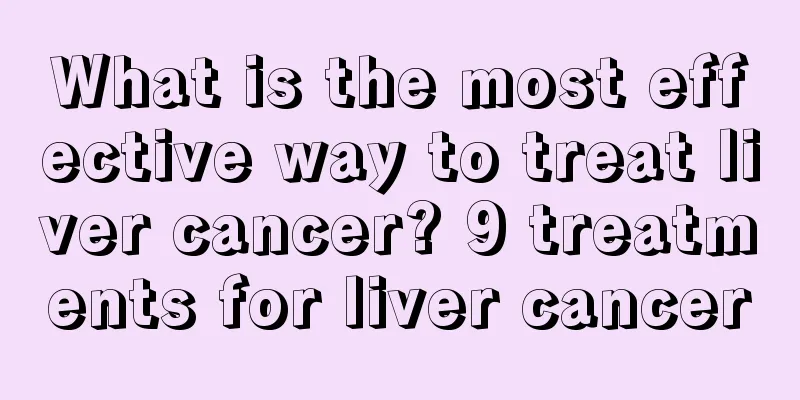What is the most effective way to treat liver cancer? 9 treatments for liver cancer

|
1. Surgical treatment Surgery is still the first choice for treating liver cancer. In recent years, the early diagnosis, localization diagnosis, tumor biology and some concepts of liver cancer surgery have been updated and improved, which mainly include the following: 1. Surgical resection 2. Various local treatments during surgery for unresectable tumors: ① Intraoperative chemotherapy and ligation of the hepatic artery and portal vein; ② Chemotherapy infusion with an implantable infusion pump; ③Intraoperative implantable microwave radiation therapy; ④Intraoperative cryotherapy; ⑤ Intraoperative electrochemical therapy; ⑥Tamoxifen plus liver perfusion chemotherapy; ⑦ Sequential treatment of liver cancer. 2. Radiation therapy In recent years, with the progress of research in radiation physics and radiation physiology, radiotherapy equipment has been developed, using cobalt 60 gamma rays or X-rays and high-energy rays from electron linear accelerators, and the irradiation methods and ranges for liver cancer have also been improved. From the original whole liver irradiation - local irradiation - whole liver mobile radiotherapy - surgical local irradiation and hyperfractionated irradiation, the radiotherapy effect of liver cancer has been significantly improved, and the side effects have been reduced to the lowest level. It mainly includes external radiotherapy and internal radiotherapy. 3. Chemotherapy 95% of liver cancer patients have lost the chance of surgery when diagnosed, and most liver cancer patients still rely on chemotherapy. In the past, chemotherapy for liver cancer was not highly evaluated, especially systemic administration, which had little effect. In recent years, the administration route of chemotherapy has been changed, and hepatic artery chemotherapy and embolization have been performed, which has significantly improved the chemotherapy effect of liver cancer. It is currently believed that catheter chemotherapy is better than systemic combined chemotherapy, and combined chemotherapy is better than single-drug chemotherapy. Hepatic artery catheter chemotherapy is considered to be the best treatment for patients with liver cancer who are not suitable for surgery. IV. Interventional Radiology The interventional radiology technique of percutaneous superselective hepatic arterial infusion chemotherapy and embolization, which emerged in the 1980s and has developed rapidly, plays a vital role. Whether it is the treatment of early localized liver cancer or mid-to-late stage liver cancer, this interventional radiology technique is a decisive treatment method and is indispensable. 5. Immunotherapy BCG, Corynebacterium microti, levamisole, tumor vaccine, embryonic cells, thymosin, transfer factor, immune RNA, etc. have been tried in China, but none of them has achieved significant therapeutic effects. In recent years, interferon, interleukin-Ⅱ, lymphokine-activated killer cells, etc. have been widely used, which can improve the treatment effect of liver cancer to varying degrees when used alone or in combination with other therapies. 6. Anhydrous alcohol injection therapy In recent years, there have been many clinical reports on the treatment of liver cancer with anhydrous alcohol injection under B-ultrasound guidance. This treatment has a significant effect in shrinking lesions, controlling and delaying tumor growth. Since this treatment does not require special conditions, is simple to operate, has few complications, causes little pain to patients, and is low in cost, it is widely used in clinical practice. 7. Laser Dynamics Therapy Ultrasound-guided local laser irradiation of liver cancer and simultaneous injection of chemotherapy drugs have achieved good results. 8. Ultrasound-guided microwave coagulation therapy This treatment is suitable for small liver cancers. 9. Guided treatment Guided therapy uses an antibody or compound with a special affinity for liver cancer as a "carrier", or guides through physical effects such as magnetism, or through tumor vascular specific guidance such as iodized oil, and then makes a cross-linked substance with a "warhead" (radioactive nuclide, chemotherapy drug, toxic protein, BRM, etc.) that has a tumor-killing effect, in order to achieve the purpose of killing more tumors with less damage to normal tissues. |
Recommend
Is radical prostatectomy safe for men with metastatic prostate cancer?
1. Despite the emergence of many new drugs, the O...
Which groups of people are most likely to have cervical cancer? What are the treatments for cervical cancer?
According to official statistics from China, cerv...
Leg cramps after waking up
What causes leg cramps when waking up? Leg cramps...
How to preserve bamboo shoots
Bamboo shoots are a favorite food of many people....
How to prove that I am not mentally ill
In fact, in the eyes of many friends, mental illn...
Things to note when using tampons and sanitary napkins
During the menstrual period, you need to pay spec...
Six distress signals indicating lung cancer
Lung cancer is a "cunning" cancer. Prof...
What to do if there is too much foam in the milk powder
Babies are very important to every family. Babies...
Treatment recommendations from lung cancer treatment experts
Lung cancer, as a stubborn cancer that has not ye...
What are the advantages of interventional treatment for liver cancer? 8 advantages of interventional treatment for liver cancer
At present, interventional therapy is the main wa...
Why are there itchy bumps on my body?
In summer, because the weather is hot and humid, ...
Why your skin becomes dark even without sun exposure
Some people have darker skin because they don'...
I can't feel my head shaking
Sometimes we will encounter many inexplicable sit...
After washing your hair with ginger juice
We all know that ginger has the effect of promoti...
What to do if canvas shoes rub the heels
How to effectively solve the problem of cloth sho...









